June 3, 2025 | 08:54 GMT +7
June 3, 2025 | 08:54 GMT +7
Hotline: 0913.378.918
June 3, 2025 | 08:54 GMT +7
Hotline: 0913.378.918
Deputy Director Nguyen Quy Duong of the Department of Plant Protection addressed the issue made by Minister of MARD Le Minh Hoan to the Vietnam Agriculture Newspaper...
I'm really interested in the subject of granting planting area codes for domestic consumption products as well as those for export; thus, what are the motivations for pushing the initiative of the Ministry of Agriculture and Rural Development?

Deputy Director Nguyen Quy Duong of the Department of Plant Protection. Photo: Duong Dinh Tuong.
This is the initiative of the Minister of MARD Le Minh Hoan. Previously, the planting area code was not a Vietnamese initiative, but rather a response to importer country requirements. Dragon fruit is the first of its type, and it took Vietnam seven years to introduce the fruit to the United States after the implementation of planting area codes.
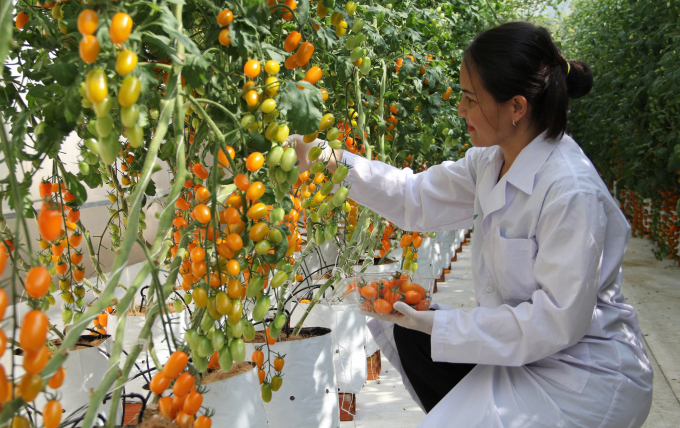
The Department of Plant Protection is developing a draft of guidelines for granting planting area codes for both agricultural products for export and for domestic consumption. Photo: TL.
Minister Le Minh Hoan proposed the following: "Why do we just give planting area codes for goods exported to serve foreigners? Why does Vietnam, with a population of 100 million, have to eat agricultural products without knowing their origin? The Plant Protection Department shall conduct research and develop a scheme for issuing planting area codes for domestic market consumption.”
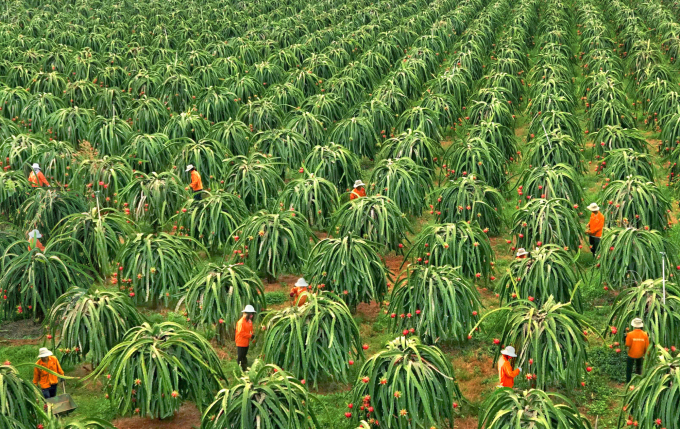
Dragon fruit exported to the US is one of the first crops that must be assessed and granted a planting area code. Photo: TL.
The decision on the granting, monitoring and management of codes of planting areas and packaging facilities is applicable to both exports and domestic consumption. The codes are of the same quality, regardless of whether they are used for tightly regulated exports or domestic products.
The Department of Plant Protection will be in charge of examining and supervising export and domestic consumption regulations. Locally, the Department of Agriculture and Rural Development will be in charge of enforcing provincial regulations. The Department shall assist and cooperate with local governments in issuing and carefully monitoring issued codes; if they are not, they will be removed promptly."
(Mr. Nguyen Quy Duong)
Which fruiters are required to obtain planting area codes and what are the conditions for granting them?
All crops on the list of permitted export crops will be assigned a code if an organization or person requests one. Previously, the minimum acreage needed to issue a planting area code for export was about 10 hectares, however, there are currently crops that cannot be grown on a 10-hectare plot or in a net house that cannot accommodate 10 hectares.
As a result, the proposed decision establishes a minimum size of 10 hectares, while also allowing for the issuance of codes in exceptional circumstances based on local practice or needs of the importing nation.
At the moment, the Department issues planting area codes for a variety of exporting crops but does not charge for them. The issued codes do not have an expiration date since they are checked annually.
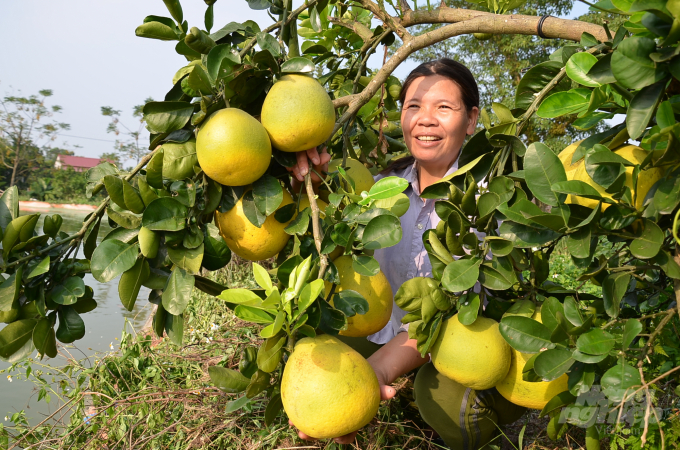
Model of safe pomelo planting in the suburbs of Hanoi. Photo: Duong Dinh Tuong.
How do you define the terms responsible agriculture?
Responsible agriculture, in my opinion, is first and foremost about making production transparent, clear, safe, and sustainable for almost 100 million Vietnamese. Second, exporting is a global duty, and when they say Vietnam, they are referring to safe and sustainable manufacturing.
Second, responsible production must be seen as a shared duty shared by a broad range of stakeholders, including not only the agriculture sector but also other ministries, departments, political and social groups.
Thirdly, it is also the producer's duty to the customer.
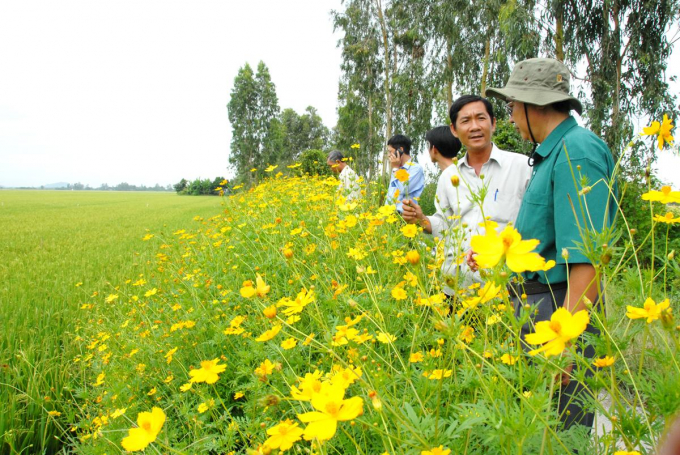
The flower-bank rice field model, a responsible agricultural approach, biological pest management, in harmony with the environment. Photo: LHV.
At the moment, the new rural area is a pervasive program in society; could we mainstream the "soft criteria," meaning safe agriculture, which encompasses communes and districts and requires less usage of plant protection agents?
We are considering soft criteria for developing new rural areas, such as implementing an integrated pest management program, or IPM, or, in this case, a Plant Health program.
Currently, some municipalities provide organic programs for homes. I find it fascinating that many rural families separate their trash, with organic materials being dug into a pit to compost and feed garden plants. This is an excellent concept since it addresses both the issue of fertilizer and pollution.
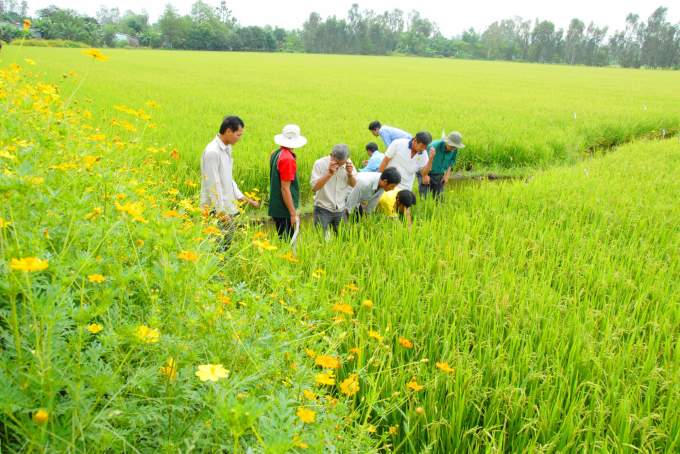
Minimizing pesticides and protecting the ecological environment should be considered as soft criteria in new rural construction. Photo: LHV.
Should the Department of Plant Protection, in light of this momentum, convene a review conference to duplicate the models of districts and provinces that have reduced pesticide use as reported in the Vietnam Agriculture Newspaper?
I believe it is critical to have a meeting to discuss the issue and develop solutions for the Mekong Delta provinces' usage of fertilizers and pesticides. The Mekong Delta is one of the most heavily sprayed areas in the nation with pesticides and artificial fertilizers.
We want to convene a conference to examine why certain areas are able to eliminate pesticides and chemical fertilizers while others are unable to do so.
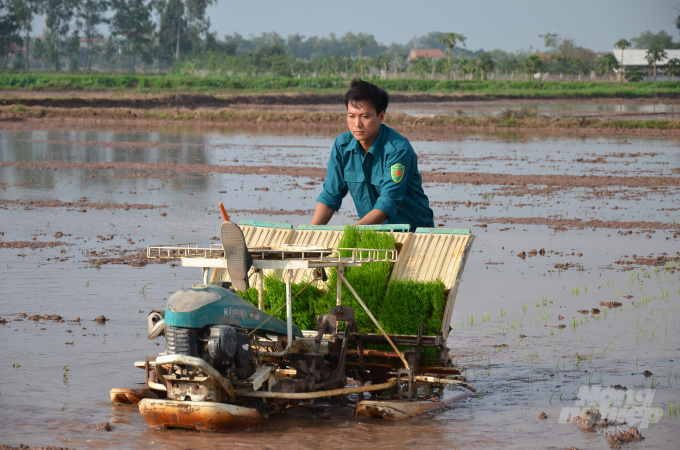
Low-density transplanting is also to reduce pests and diseases. Photo: Duong Dinh Tuong.
Many communes and even districts now have a significant proportion of residents who do not use pesticides. Therefore, what do you believe is the scientific foundation for that assertion?
It is based on the IPM program's application. Hanoi is a city that makes significant investments in IPM for each home. Additionally, the use of the rice intensification system (SRI), the use of resistant cultivars, sparse transplanting, young seedlings, and balanced fertilizer treatment have resulted in a significant reduction in the number of damaging pests and illnesses.
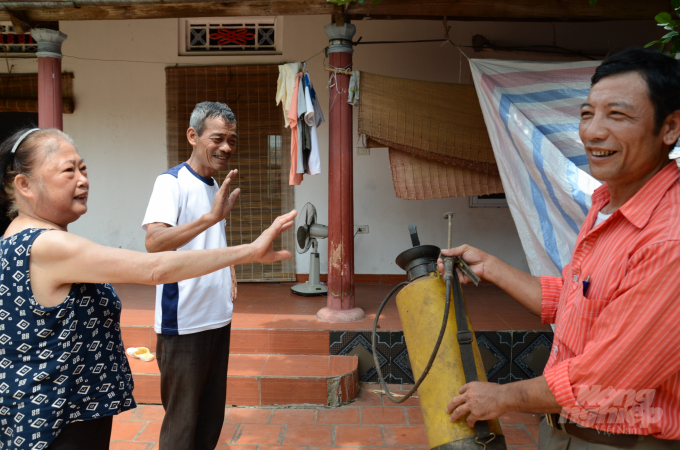
Many farmers in Do Dong commune, Thanh Oai district (Hanoi) are no longer use pesticides. Photo: Duong Dinh Tuong.
When these actions are repeated for a large number of crops, the environment is safeguarded, restoring equilibrium. Pests and diseases may damage plants, but within the allowed level, they have a negligible effect, and farmers are thus not required to apply pesticides.
Local authorities' forces and involvement
Is the Department anticipating problems in granting domestic market planting area codes?
While the import requirements of other nations are very clear for export products, the items are intended for local use. To begin, manufacturing must adhere to GAP and Vietnam's existing food safety standards. Additionally, we observe that if communities follow the movement, it is very hazardous, indicating the need for a particular path.
Another point is resource-related. Without support resources, it will be very difficult to expand area codes for domestic products, since, as with the IPM example just now, Hanoi succeeds due to its greater resources.
As a result, we ask local governments to provide funding for this effort in the draft decision.
Thank you!

(VAN) VAAS and numerous Vietnamese enterprises have signed cooperation agreements with Japanese partners to promote agricultural technology and trade connectivity.
/2025/05/29/5625-12-214801_567.jpg)
(VAN) Provincial mergers in the Mekong Delta promise to streamline administration, expand inter-provincial raw material areas, and foster close linkages in agricultural value chains, benefiting both businesses and cooperatives.

(VAN) Merging Mekong Delta provinces contributes to the expansion of agricultural raw material areas, addressing previous constraints caused by provincial boundaries. Additionally, this expansion will reduce costs and strengthen linkages between businesses, cooperatives, and farmers.
/2025/05/29/1043-2-153730_145.jpg)
(VAN) The Government's policy to merge provincial-level administrative units opens up major opportunities for the Mekong Delta region to reshape its agricultural development strategy toward large-scale production, effective regional linkages, and sustainability.

(VAN) The mutual export of agrifood products between the European Union (EU) and the United Kingdom (UK) must occur again without certification, border controls or other red tape. This was agreed at the UK-EU summit.
/2025/05/22/5121-2-173645_677.jpg)
(VAN) NBSAP Tracker identifies strengths and areas for improvement in the National Biodiversity Strategy, based on each region’s priorities and capacities.

(VAN) The draft amendment to the Circular on rice export trading stipulates a periodic reporting regime for rice exporting enterprises.